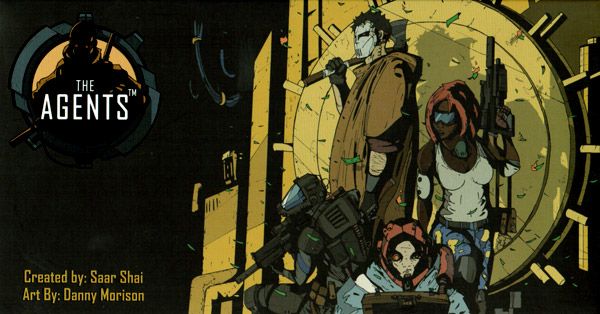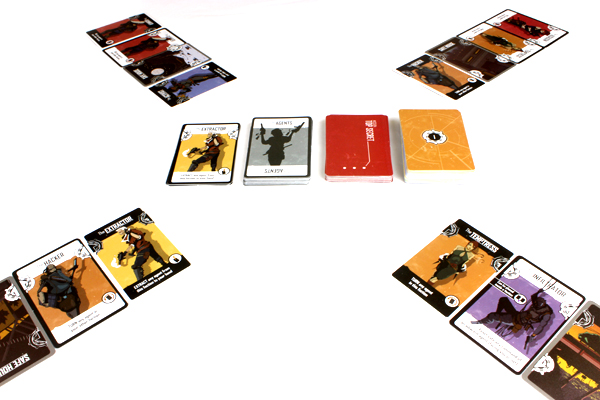Living on the Edge: A Review of The Agents

As the Agency shuts down, dismissed and disbanded Agents all around the world are trying to figure out what’s next. In The Agents, by Saar Shai, players enlist agents to further their ambitions, build factions, complete missions, and ultimately earn the most points.
Gameplay
Note: by request of the publisher, our evaluation of this game was based on The Agents Mark II version of the rules, which are newer than those included in the original game box.
The Agents consists of 3 decks of cards: the Agents deck, the Missions deck, and Intelligence Points (IP) deck. At the beginning of the game, each player receives 3 Agent cards and 1 Mission card. The object of the game is to be the first player to collect 50 total Intelligence Points. Points are scored by adding agents to your factions and by completing Missions.
Unlike most card games, cards are not played into a common area on the table. Instead, cards are played to individual factions on a player's left or right. Each player has 2 factions to which he can add Agents, both of which are shared with another player (sitting on the other side of the faction). Safe House cards are the first cards included in a faction, and are placed between players at the beginning of the game.
Agent cards added to a faction belong to both players who surround the faction. Each Agent card is a "Double-edged™" card that can be rotated in either direction. Depending on the direction the card is facing, one player has the potential to earn points while the other player can choose to invoke the action specified on the card. The player who first plays the card decides which direction he would like it to face and whether he would like the potential points or the action. Many of the actions include ways to affect other cards, such as rotating them to face the opposite direction or moving them to another faction. As soon as an Agent card is first played, the action can be invoked immediately by the player to whom the action is facing. It can also be reactivated during the course of a turn.

Some Agent cards are special cards called Free Agents. These cards can be placed between a player and any other player. They are not added to factions, but earn immediate points and can carry out immediate actions.
Mission cards are placed beneath a faction and belong only to the player who plays them. They contain a certain goal to complete that relates to the Agents in the faction — for instance, two matching Agents who are adjacent to one another might complete the mission. Completed missions are worth Intelligence Points.
On a turn, a player can perform 2 actions from among the following:
- Play an Agent — Play an Agent card to a faction or play a Free Agent
- Reactivate a Command — Use the command of an Agent that was placed previously, as long as the command is directed at you.
- Buy Agents and Missions — Trade in Intelligence Points for up to 2 Agent cards and up to 2 Mission cards.
- Trade in Missions and Agents — Discard any number of Agent and Mission cards from your hand and replace them with cards drawn from the corresponding decks.
A player may then assign, remove, or move missions as desired.
At the end of the turn, the player collects intelligence points for each completed mission (with points specified on the card), as well as Agent cards whose "Data-Token" arrows are directed towards him. Each Agent card contains half of a Data-Token arrow, which is either white or black in color. When placed next to another agent facing the same direction, these halves form a whole arrow. Complete Data-Tokens of a single color earn 2 points, while Data-Tokens of mixed colors only earn 1 point.
Play continues until 1 player collects a total of 50 points or more. This player is declared the winner.
Review
The Agents contains quite a few cards and definitely has a learning curve. That being said, it is certainly learnable and playable for casual gamers who are willing to commit some time to the process. Once it clicks, you'll comprehend some of the really interesting aspects of this game, particularly in the vast amount of trade-offs it presents to you. Nearly every decision comes with a trade-off that should be carefully evaluated.
The Double-edged cards, for instance, are particularly interesting, as they force you to make a decision that balances your needs with the benefit that you provide to the other player. This game offers direct targeting of other players that would normally be found in a "take that" style of game — but rather than destroying your opponents, you must decide in which way you will benefit them. It feels like a strangely competitive form of charity. Your opponent surely can't get angry that you targeted him if you're giving him some sort of benefit, right?
Missions are also very important, since they can continue to score points each and every turn the condition is still met. If you forget to pay attention to other players' missions, they could easily score a ton of points. Thus, it behooves you to use the actions at your disposal to switch up the faction as much as possible to hinder your opponent's missions while benefiting your own.
The artwork and components are quite nice. The cards feel like they are either plastic or coated in plastic, which makes them slide around almost excessively — this is great for shuffling, but sometimes makes them difficult to handle without them slipping out of your hand. It is the only minor drawback of these nice cards that should last a long time.
For much of the game, we felt like the pace was a bit slow. This was partially due to the initial learning curve and partially due to the amount of information that is available to process. However, the Double-edged cards do allow players opportunities to perform actions even when it is not their turn, which keeps players engaged.
We also felt like there should have been more opportunities to change up the Agent cards, perhaps as one of the possible actions to take on a turn. As it stands, the only way to rotate or move Agent cards is by activating a command on a card that is facing you. It's not necessarily a problem, but we felt like our factions remained rather stagnant throughout the game.
In the end, The Agents is an original and thought-provoking game with much potential for strategic depth that is going to really appeal to more experienced gamers. Committed casual gamers can certainly pick it up and enjoy it, as well, albeit with a learning curve at first. The many trade-offs offer interesting choices and ways to benefit yourself as well as other players.
A new and improved edition of The Agents is now seeking funding on Kickstarter through May 21, 2014. Check it out if you like what you see.
Pros: Thought-provoking, unique mechanics, many trade-offs and interesting decisions, well-balanced design
Cons: A bit slow-paced, steep learning curve at first, could use more opportunities for actions related to Agent cards
Disclosure: we received a complimentary review copy of this game.






